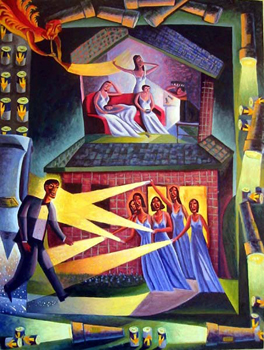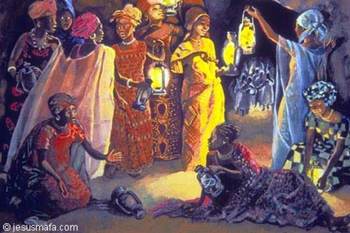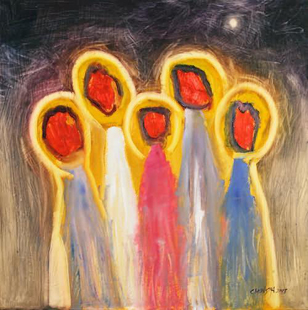For Sunday November 8, 2020
Lectionary Readings (Revised Common Lectionary, Year A)
Amos 5:18-24
Wisdom of Solomon 6:17-20
I Thessalonians 4:13-18
Matthew 25:1-13
I’ve never liked the parable of the ten bridesmaids. When I first heard it as a child, I annoyed my Sunday School teacher by asking all the “wrong” questions in response: why do the bridesmaids have to bring their own light to a wedding reception? Why are the “wise” bridesmaids stingy and mean? Why doesn't the groom show up for his own wedding until midnight? Why does the bride — whoever she is — put up with such a ridiculous delay? Where even is the bride in this story? And why, after keeping his poor bridesmaids waiting for hours, does the groom blame them for lateness — and shut his door in their faces?
In all honesty, these questions still bother me. They prevent me from gathering the pieces of this particular parable into a single interpretation that I can offer up with a colorful bow. Instead, all I can do is keep the pieces scattered, and examine them by turns. Or (to switch metaphors), to turn the parable around and around in my fingers as if it’s a diamond, and see what it reveals from each angle, in each facet. I won’t pretend that my various discoveries cohere and avoid contradiction — they don’t. But maybe this is what we’re supposed to do with Jesus’s parables. Maybe we’re supposed to let their meanings open out, wider and wider and wider. Maybe the truths the parables reveal are various and infinite. Impossible to lock down.
In any case, here we go. Here are some interpretative possibilities for The Story of the Bridesmaids:
There IS going to be a wedding someday. No, really. There IS. Here’s a potentially uncomfortable question: when is the last time you heard (or preached) a sermon about the second coming of Jesus? Do you even remember? When is the last time you thought to yourself, “Oh my goodness, what if it’s today?! What if today is the day when God’s kingdom comes in all of its fullness, and our broken earth is restored and made whole, just as Scripture promises?”
The truth is, many of us have grown accustomed to the bridegroom’s absence. Accustomed and indifferent. His absence and delay are our norms, so much so that deep in our secret hearts, we no longer believe he’s going to return. We no longer believe there’s going to be a wedding. After all, isn’t that sci-fi, children’s story, parting-of-the-clouds stuff embarrassing? Won’t people think we’re delusional if we take it seriously?
 |
Maybe. But the problem with letting go of the eschaton is two-fold. One, we have to make Jesus a liar in order to do it. Jesus said that he will return, just as surely as he said he would be crucified, buried, and resurrected on the third day. On what grounds shall we choose to disbelieve a stated promise of the Risen Christ?
And second, the coming of God’s kingdom in all of its healing, justice-making fullness is the yardstick against which we must measure all of our own healing, justice-making efforts. The wedding feast is our ideal, our goal, our destination. Without it, we have no standard. No accountability. Nothing to lean into, nothing to work towards, nothing to anticipate as we labor in God’s name.
The parable of the bridesmaids ends with a wedding. It ends in celebration and joy. We dare not abandon this glorious ending simply because we’ve grown tired of waiting.
It’s not going to go the way you think it’s going to go. In the parable, the bridesmaids have to wait so long for the groom’s arrival, they fall asleep. Surely they don't want the party to begin at midnight. It's not their choice or desire to wait. But the five bridesmaids who carry extra oil in their flasks prepare themselves for the long haul, just in case. They consider and take seriously the possibility of surprise, of delay, of hardship, of unpredictability. They don’t allow their preconceived ideas about the groom or the party to distract them from what’s actually in front of them. They remain open and adaptable to the circumstances they find themselves in.
Do we? Are we ready for the long haul? Do we have the flexibility to handle the unexpected? Or are we clinging to rigid, narrow notions of what God’s presence looks like, such that we miss God when God actually shows up? Can we bear an unpredictable bridegroom? A bridegroom who surprises us? If Jesus’s notion of time, faithfulness, fulfillment, and celebration look different from ours, will we still follow him into the wedding hall — or will we bail?
 |
Sometimes, doors close. Do what is needful now. I don’t like the fact that the five “foolish” bridesmaids in the parable arrive too late to gain entrance to the wedding. I don’t like the fact that the groom closes his doors. I don’t like the fact that the story leaves five women out in the cold.
But whether I like these things or not, they happen. Windows close. Chances fade. Time runs out. We know this; we experience it regularly. The opportunity to mend the friendship, forgive the debt, break the habit, write the check, heal the wound, confront the injustice, embrace the church, release the bitterness — closes down. The opportunity ends.
We hate this, of course, so we tell ourselves it isn’t true. We tell ourselves that there’s always tomorrow. That we’ll get to it — whatever “it” is — eventually. That there’s still time left.
But what if there isn’t? What if this parable is telling us to be alert now, awake now, active now? What if it’s inviting us to live as if each day — singular and fleeting — is all we have? Tomorrow — if it comes — will be its own gift, its own miracle, its own challenge. Don’t presume that it belongs to you. Do what is holy and necessary now.
You’re more valuable than your oil supply. So stick around. As far as I can tell, the fatal mistake the five “foolish” bridesmaids make is that they leave. They assume that their oil supply is more important to the groom than their presence at his party. So they ditch the scene at its most crucial moment and go shopping, thus depriving themselves of a wonderful celebration, and depriving the bridegroom of their companionship, support, and love on his special day.
This is a point I want to press into a little bit, because I totally get the “foolish” bridesmaids in this narrative moment. I get how hard it is to stick around when my “light” is fading and my reserves are low. I get what it’s like to scramble for perfection, to insist on having my ducks in a row before I show up in front of God, or the church, or the world. After all, it’s scary and vulnerable-making to linger in the dark when my pitiful little lamp is flickering, my once-robust faith is evaporating, and my measly, leaky flask is filled with nothing but doubt and pain and grief and weariness. Only a bridesmaid who trusts in the groom’s deep and unconditional compassion, only a bridesmaid who knows that the groom has light and oil to spare, only a bridesmaid who understands that her presence — messy and imperfect though it might be — is of intrinsic value to the groom, will find the honesty and the courage to stay.
The bridesmaids in the parable lack this comprehension and courage. So five of them scatter, and I believe the wedding procession suffers as a result. Five fewer lights brighten the groom’s path. Five fewer voices cry out with joy at his arrival. Five fewer friends dance and sing the night away in honor of the groom and his beloved bride. The loss is communal, extensive, and real. This is not a situation to celebrate or endorse; it’s a situation to grieve.
Perhaps the lesson of this parable is: don’t allow your fear or your sense of inadequacy to keep you away from the party. Be willing to show up as you are — complicated, disheveled, half-lit and half-baked. The groom delights in you — not in your lamp. Your light doesn’t have to dazzle. Remember, God created light. God is light. And Jesus is the light of the world. Your half-empty flask of oil isn’t the point. You are. So stay.
 |
Scarcity isn’t a thing in God’s kingdom. Quit hoarding. Ironically enough, the “wise” bridesmaids in Jesus’s parable distrust the sufficiency, generosity, and love of the bridegroom as much as the “foolish” bridesmaids do. Operating on the basis of scarcity and fear, they refuse to share their oil. Smug in their own preparedness and “wisdom,” they forget all about mercy, empathy, kinship, and hospitality. They forget that the point of a wedding celebration is celebration. Gathering. Communing. Joining. Sharing. It doesn’t occur to them that their stinginess has consequences. That it sends their five companions stumbling into the midnight darkness. That it diminishes the wedding, depriving the bridal couple and their remaining guests of five lively, caring companions.
I’m not sure what it will take for us Christians to live fully into the abundance of God. But it’s clear that our assumptions about scarcity are killing us. We’re so afraid of emptiness, we worship excess. We’re so worried about opening our doors too wide, we shut them tight. We’re so obsessed with our own rightness before God, we forget that “rightness” divorced from love is always wrong. We live in dread that there won’t be enough to spare. Enough grace. Enough freedom. Enough forgiveness. Enough mercy. Somehow, we would rather shove people into the dark than give up the illusion of our own brightness.
What would it be like to stop? To stop all of this? What would it be like to care more about the emptiness in our neighbor’s flask than the brimming fullness of our own?
What if Jesus isn't the door slammer? It is possible, given the context in which Matthew's Gospel was written, that Jesus isn't the bridegroom in this parable. We know that the Matthean "Jesus movement" of the first century was in conflict with local religious leaders who considered their Christian peers heretical and deviant. It is likely that there was much discussion around who belonged and who didn't, who was "in" with God, and who wasn't.
Sound familiar? One of the great tragedies of the Christian story across history is that we are better known for policing our borders than for welcoming our neighbors. We are quick to say, "I don't know you," to those who believe or practice differently than we do. We feel safer and more pious behind closed doors than we do with open arms. Maybe this parable is showing us the ugliness of the closed door.
As I wrote at the start, these are interpretative possibilities for Jesus’s parable of the bridesmaids. Surely there are other ones. Other angles. Other facets. Other questions to ask and challenges to ponder. Which ones speak to you? Where do you see yourself in the story, and where do you see Jesus, looking at you? Locate yourself and locate him. Start talking. The doors are open and the wedding hall is full of holy light. This is the place to begin.
Debie Thomas: debie.thomas1@gmail.com
Image credits: (1–3) Global Christian Worship.





